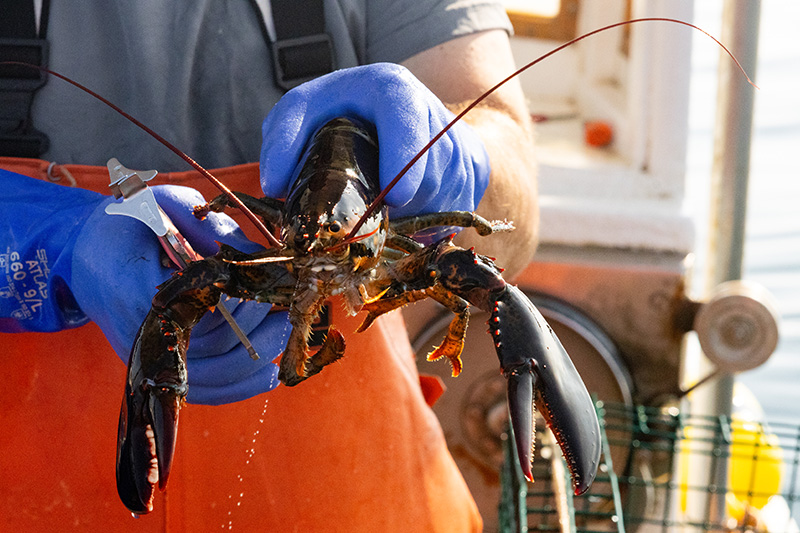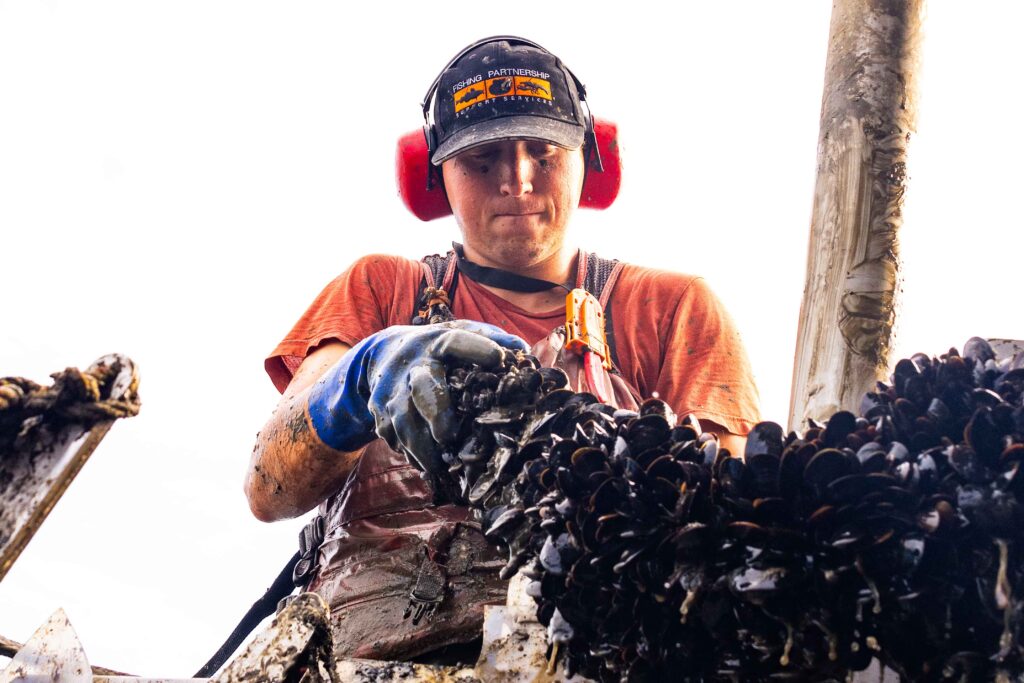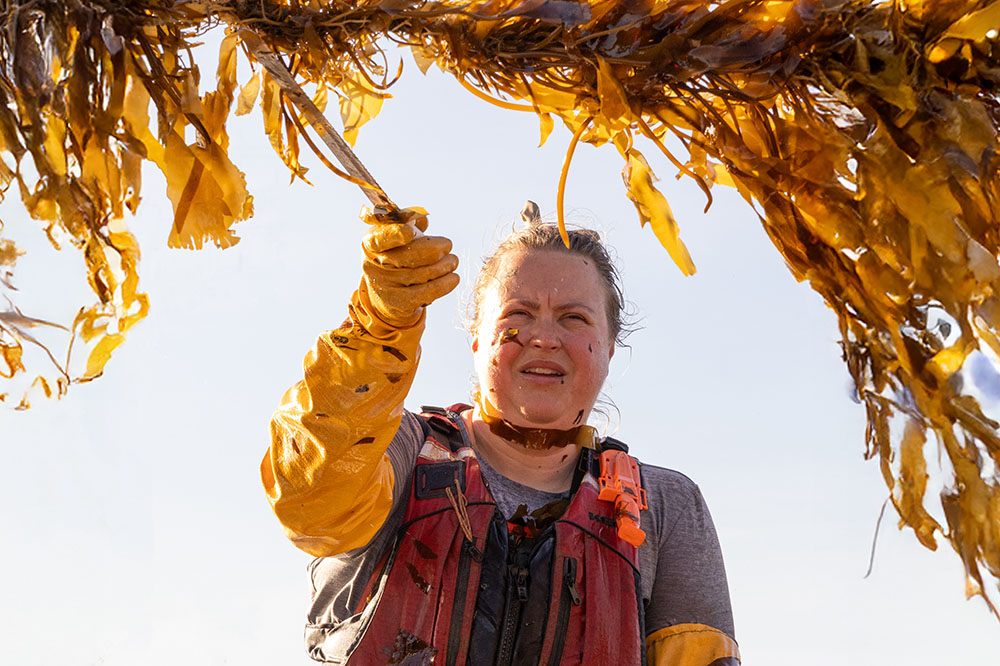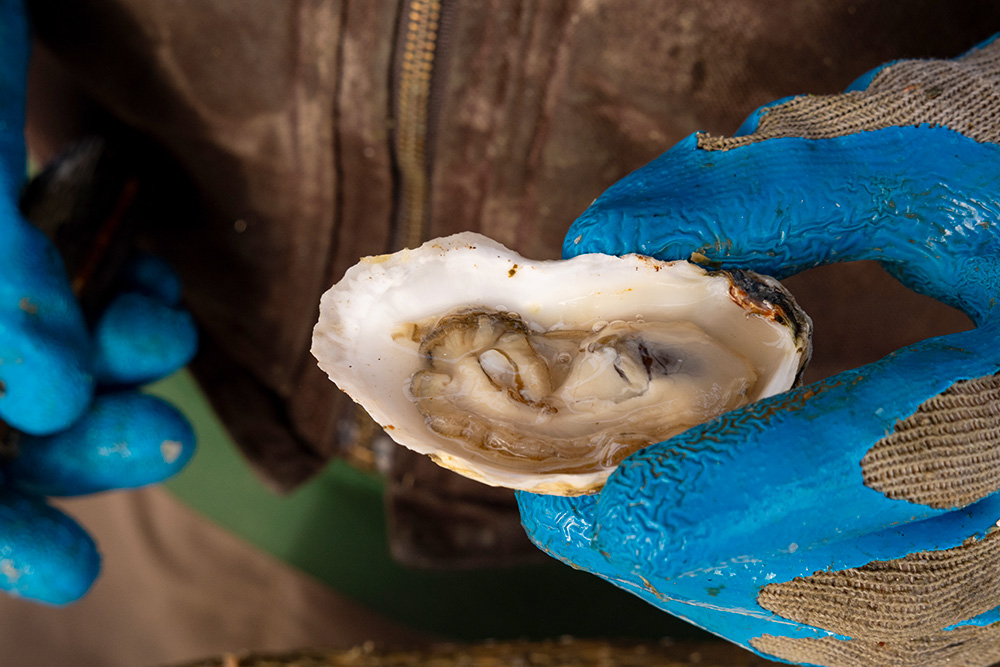Reducing Emissions in Maine’s Seafood Sector using Green House Gas Assessments
The Maine seafood sector is at the onset of a once-in-a-century energy transition as it looks for ways to decarbonize through electrification, low-carbon fuels, optimization tools, and efficiency technologies.
To accelerate and support this transition, Island Institute commissioned greenhouse gas (GHG) assessments—analyses that measure the amount and sources of GHGs associated with specific activities—to better understand the emissions footprint of Maine’s lobster, mussel, kelp, and oyster supply chains.
The goal of these studies is two-fold:
- To assess options that enable seafood businesses to reduce emissions, lower operating costs, and adapt to changing climate and market conditions.
- To highlight opportunities to implement state-level policies and programs that promote energy-efficient, climate-smart practices.

The findings from these studies are clear: Maine seafood is already among the lowest-carbon protein sources available (See Table 1). At the same time, meaningful opportunities exist to reduce GHG emissions for businesses operating on the front lines of climate change.
Through GHG emissions reductions, marine businesses can reduce their contribution to global climate change, a key driver of business uncertainty. Reducing emissions also stabilizes or lowers operating costs, allowing fishermen and harvesters to reinvest in resilient business operations.
Strategic investments—especially in the electrification of work boats and associated shoreside charging and clean energy infrastructure—can significantly cut emissions, lower long-term operating costs for businesses, and strengthen Maine’s leadership in sustainable food production.
These reports offer a path forward. With deeper collaboration, targeted investment, and shared innovation, we can turn these findings into real-world projects that secure Maine’s working waterfronts and shape a resilient, sustainable marine economy—one that can serve as a national model.
Thank you to the Builders Vision, World Wildlife Fund and Jane’s Trust for providing funding support, and to the generous donors that make this work possible.
The findings, connections, and recommendations in these reports are based on analyses of seafood businesses and are meant to be illustrative examples. They are not assumed to be representative of their entire respective seafood industry.
Greenhouse Gas Assessment Reports
Click the links below to learn about each study.
.
LOBSTER & CRAB
Greenhouse Gas Assessment of Luke’s Lobster
- The total annual GHG emissions of Luke’s Lobster include the entire supply chain, from bait to restaurant, allowing for more insight into opportunities for reduction.
- The primary driver of emissions is fuel consumption while fishing for bait and lobsters, accounting for almost 75% of the GHG emissions.
- Recommendations include transitioning fishing fleets to biodiesel or hybrid electric powered boats, increasing locally sourced bait, and improving efficiency at processing facilities.
MUSSELS
Greenhouse Gas Assessment of Bangs Island Mussels
- The total annual GHG emissions for mussel farming, processing, and distribution are lower per gram of protein than tofu.
- Primary drivers of emissions include product loss due to shell breakage, as well as boat fuel consumption.
- Recommendations include reducing broken mussels, transitioning work boats to electric or hybrid, and adopting renewable energy for land-based processing.
KELP PRODUCTS
Greenhouse Gas Assessment of Atlantic Sea Farms
- The total annual GHG emissions for kelp farming, processing, and distribution are driven by post-harvest processing, making it distinct from the other seafood businesses assessed.
- Primary drivers of emissions include energy use at dehydration facilities and transportation.
- Recommendations for reducing emissions include transitioning to renewable energy, improving farming yields, and reducing storage times.
OYSTERS
Greenhouse Gas Assessment of Bombazine Oyster Company (formerly Ferda Farms), Deer Isle Oyster Company, Mook Sea Farm, and Pemaquid Oyster Company
- The total annual GHG emissions for oyster farming vary depending on farm characteristics such as scale, husbandry techniques, and farm layout.
- Primary drivers of emissions include fossil fuel use for boats and infrastructure, as well as electricity for heating and processing.
- Recommendations for reducing emissions include electrification of workboats, energy efficiency improvements, optimizing spat sourcing, and exploring alternative packaging.
Shared Findings
These in-depth analyses, covering seven Maine seafood businesses, indicate highest emissions in the following three areas:
- Fossil fuel use on fishing and aquaculture vessels.
- On-shore energy consumption for the built environment, including heating, drying, refrigeration, freezing, and hatchery operations.
- Land-based transportation and distribution impacts emissions directly or indirectly for all aspects of business operations. Emissions from distribution activities are highly variable depending on distance covered and distribution method.
Recommendations for Businesses
- Transition on-land medium-and heavy-duty vehicles, as well as on-the-water vessels, to non-fossil fuel-based energy sources (i.e., electric and hybrid vehicles and vessels).
- Increase charging infrastructure located at or near the water’s edge to accommodate vehicle and vessel electrification.
- Improve operational efficiency through process optimization and smart technologies to reduce run time in daily farming operations.
- Improve operational efficiencies on shoreside processing and handling facilities to lower energy use, GHG emissions, and operational costs.
- Improve crop yields and minimize waste by upgrading farming gear and on-the-water processing equipment.
Recommendations for Policy and State Programs
The following recommendations align with statewide priorities outlined in both the updated 2024 Maine Won’t Wait: A Four-year Climate Action Plan, as well as the 2025 Plan for Infrastructure Resilience. In many cases, these recommendations reinforce or expand goals already established by the State of Maine. Recommendations include:
- Increase awareness and uptake of existing programs, particularly Efficiency Maine Trust’s Custom Program, to support efficiency upgrades in the built environment by the seafood sector.
- Assess whether the seafood sector represents a good use case for medium- and heavy-duty vehicle electrification and prioritize this sector for implementation support because of the co-benefits to adaptation for these businesses.
- Support the collection of data on the performance and long-term cost and emissions reductions of electric and hybrid work vessels through demonstration projects. Use data to expand existing electric vehicle incentives to cover marine vessels and shoreside infrastructure.
- Maintain and increase access to capital—including low-interest loans with flexible terms and other incentives such as tax credits or grants—to help defray the costs of energy efficiency and beneficial electrification upgrades.
- Support and incentivize businesses to take advantage of behind-the-meter clean energy generation and storage—such as on-site solar panels that power a business directly without relying on the grid.
- Support research to better understand the use of kelp aquaculture might help capture and store carbon.
- Invest in island and coastal grid infrastructure to improve reliability and capacity —enabling clean energy use, economic development, and community resilience.
Climate of Change Film Series
Climate of Change is a seven-part short documentary series showcasing how Island Institute collaborates with Maine’s working waterfront businesses and communities to drive innovative, real-world solutions to climate and economic challenges. Through powerful storytelling, we celebrate the people, partnerships, and ingenuity at the heart of community-led solutions. More than stories, they’re a call to action for a stronger, more resilient Maine coast.
LEARN MORE ABOUT THE FILM SERIES
Partners
|
Atlantic Sea Farms Bangs Island Mussels Bigelow Laboratory for Ocean Sciences Builders Vision Philanthropy Bombazine Oyster Company (formerly Ferda Farms) Deer Isle Oyster Company |
Jane’s Trust Foundation Luke’s Lobster Mook Sea Farm Pemaquid Oyster Company World Wildlife Fund |





